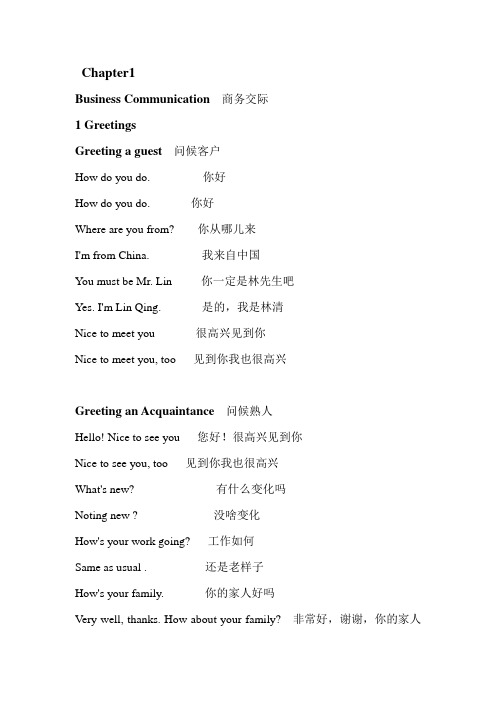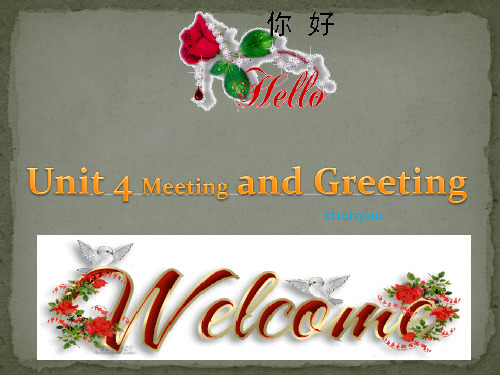Chapter 1 Meeting and Greeting People
- 格式:ppt
- 大小:288.00 KB
- 文档页数:12


Unit 1 Meeting new people开学第一课:The First PeriodThe Second PeriodThe Third PeriodThe Fourth PeriodUnit 5 Animals in dangerTeaching Aims(教学目标):1.能听、说、读、写本课的核心词汇:thousand, hundred, wild, way, die, learn, send, in danger, in the past, take care of2.能熟练掌握核心句型:In the past, there were many pandas.What can we do to help them?3.知道动物是人类的朋友,人类应该和动物建立良好的关系,要保护动物。
Teaching Importances and Difficulties (教学重难点):1.能在语境中正确运用本单元的核心词汇。
2.用There was/were …对某种东西的数量进行陈述。
3.了解字母u及字母组合ue、oo在单词中的发音规律,拼读简单的单词。
Teaching Tools(教学用具):录音机、自制课件、照片等Teaching Procedures(教学过程):StepⅠ. Warm up and revision(热身与复习)1. Sing a song.2. Play a game: Apple tree3. Count the numbers together.Step Ⅱ. Presentation and practice (自主探究)1. 生词关T: Please write the meanings on your paperthousand______ hundred______ wild________only________ about______ whale _________am/is_______(过去式) are______(过去式)2. T:Show the pictures and learn the new words: thousand, hundredSs:Read these words after teacher.3. Work in groups to read the new words. Recite the new words, then recite in groups。


Chapter1Business Communication商务交际1 GreetingsGreeting a guest问候客户How do you do. 你好How do you do. 你好Where are you from? 你从哪儿来I'm from China. 我来自中国You must be Mr. Lin 你一定是林先生吧Yes. I'm Lin Qing. 是的,我是林清Nice to meet you 很高兴见到你Nice to meet you, too 见到你我也很高兴Greeting an Acquaintance问候熟人Hello! Nice to see you 您好!很高兴见到你Nice to see you, too 见到你我也很高兴What's new? 有什么变化吗Noting new ? 没啥变化How's your work going? 工作如何Same as usual . 还是老样子How's your family. 你的家人好吗Very well, thanks. How about your family? 非常好,谢谢,你的家人也好吧Very well, too 也很好How's business 生意怎么样Couldn't be better. 好得不得了Very good 真棒2. ReceptionReceiving a Guest at the AirportA: How was your flight?旅程怎么样?B: Just wonderful! Good food and good service.棒极了。
可口的食物,优质的服务。
A: Is this your first visit to Yangzhou?这是你第一次来扬州吗?B: Yes. I hope it won’t be my last.不错。


Unit OneHello, Hi(注意:标题跟着教程改)Key and TranslationSECTION I Talking Face to Face Imitating Mini-Talks1Work in pairs. Look at the pictures and practice the following mini-talks for greeting and introducing people.Acting out the Tasks2Work in pairs and act out the tasks by following the above mini-talks.Key for reference:1) Task: Meet Prof. Waters at the airport.A: How do you do, Prof. Waters. I‟m your interpreter(翻译), Li HongB: How do you do? Li Hong. Nice to meet you.A: Welcome to China.B: Thank you for coming to meet me.2) Task: Exchange business cards with Mr. Green.A: Pleased to meet you, Mr. Green. Here is my business card.B: Thank you. Ah, so you are Liu Ming.A: Yes, I‟ll be your tour guideB: It‟s nice to meet you. Here is my card.3) Task: Introduce a foreign friend to your colleague.A: Hello, Lily. This is Mrs. Smith, our new English teacher.B: How do you do, Mrs. Smith? Welcome to our school.C: Thank you. Oh, the campus is beautiful.B: Yes. May I invite you to have a cup of tea together?4) Task: Greet your business partner, Mr. Johnson, at a trade fair.A: Hello, Mr. Johnson. Nice to meet you again at the trade fair.B: Hi, Zhang. How are things with you?A: Fine. We have brought a new product to the fair.B: Great! I‟m eager to see it.5) Take leave and say goodbye to your hostess, Mrs. Waters.A: Hello, Mrs. Waters. We‟ve got to leave now.B: Why so early? I have got some nice tea for you.A: No, thank you. It‟s time we left.B: OK. Then see you tomorrow.Studying Business Cards3Business cards are very useful for introducing people. Now let’s read them and try to use the information in the cards in introductions.匹兹堡州立大学社会语言学系迈克·布林博士校长地址:堪萨斯州匹兹堡市北大街1701号匹兹堡州立大学邮编:KS 66762电话:316-231-2750传真:316-231-2750Following Sample Dialogues4 Read the following sample dialogues and try to perform your own tasks. Putting Language to Use5Imagine you are meeting an English teacher from the USA at the airport. Read aloud the following dialogue with your partner by putting in the missing words.Key: 1. Robert 2. Thank you 3. pleasure 4. Here is 5. this is6. How do you do7. call me8. journey9. the hotel 10. very kind6Imagine you are a new employee at a joint venture. Mr. Smith is the general manager there. You meet him for the first time at the company’s canteen. Fill in the blanks according to the clues given in the brackets. Then act it out with your partner. Key: 1. Excuse me 2. Oh, yes. How do you do, Mr. Smith. I‟m Li Ying.3. Welcome to our company4. you are the general manager5. Here is my card6. Thank you7. My email address is l-i-y-i-n-g@-yahoo-dot-com-dot-cnSECTION II Being All EarsLearning Sentences for Workplace Communication1Listen to 10 sentences for workplace communication cross-referenced with their Chinese translations.Script:1) Hello, nice to meet you. Mrs. Waters.2) Excuse me, are you Mr. Green from England?3) I‟m Jack Green from Canada. Here is my card.4) Glad to meet you, Paul. Here is my card.5) How are you, Jack? Nice to meet you, again.6) Welcome to our college, Dick.7) Hi, long time no see. Do you remember me?8) What a surprise to see you here.9) Oh, it‟s you, President Kong. Nice to see you again.10) My name is Dick Washington. Please call me Dick.2Listen to the following sentences for workplace communication in Column A and match each one with its Chinese version in Column B.Script:1) How are you? Nice to meet you.2) Hello, this is Professor Kong, our president.3) Hi! My name is Peter Green. Glad to meet you.4) Hello, John. So glad to see you again.5) Good morning, Mr. Smith. How are you doing?6) Hi! Jack. Do you still remember me?7) May I introduce my sister to you?8) What a surprise to see you here.9) Welcome to our college. This is my card.10) Are you Mr. Black from America?Key:1-h, 2-j, 3-e, 4-a, 5-g, 6-b, 7-I, 8-c, 9-d, 10-f3 You will hear 6sentences for workplace communication. While listening, you are required to complete the dialogues by ticking the appropriate responses out of the four choices provided. Script1. How do you do?2. Hi, Tom. How are you?3. Hello, Mary, I‟d like you to meet Mark.4. Hello. Let me introduce myself. I am Linda.5. Let me introduce the new professor to you.6. Do you think we‟ve met before?Key:1. A2. A3.D4. C5.A6. DHandling a Dialogue4Listen to a dialogue and decode the message by finding out the correct choices in the brackets according to what you have heard.Key: 1. Thomson 2. a third-year 3. pleasure 4. program 5. master‟s 6. touch Understanding a Short Speech/Talk5 Now listen to a short speech/talk and fill up the blanks according to what you have heard. The words in brackets will give you some hints.Script:Good morning, everyone. It‟s my honor to introduce Professor Waters to you. (Applause) Prof. Waters is from the United States of America. She will teach us English this term. Prof. Waters has taught students in many different countries. She is a very good teacher and she is really an expert in English teaching. She is the author of a number of books in this field. So, it is a pleasure for us to have her as our English teacher here. Now, let‟s welcome her to say a few words to us! (Clapping)Key:1. Professor Waters2. the United States of America3. this term4. in many different countries.5. language teaching6. a number of books7. our English teacher8. a few words6 Listen to the speech/talk again and complete the information in Column A with the right choices in Column B.Key:1.c2.a3.b4. a5.cSECTION III Trying Your HandPracticing Applied WritingWriting Sentences and Reviewing GrammarWrite and Describe a PictureSECTION IV Maintaining a Sharp Eye Passage IInformation related to the reading passageEnglish expressions borrowed from French:Over the long years, the English language has borrowed a great number of French words or expressions. Some of them have been so absorbed in English that speakers may not realize their origin. Other expressions like “faux pas”have retained their “Frenchness”, with which speakers tend to sound modern. These expressions are often written in italics. The following are a few French expressions which are commonly used in English.1)Faux Pas: it refers to a socially awkward or tactless act, a foolish mistake, something thatshould not be done. 失礼2)au pair: A foreign female who works for a family (cleaning and/or teaching the children)in exchange for room and board. 帮助料理家务换取住宿的外国女学生3)Bon appétit: The closest English equivalent is “Enjoy your meal” . 用餐愉快4)esprit de corps: It is s imilar to “group spirit” or “morale”. 团队精神5)rendez-vous: In English it means “an arrangement for a meeting”. It can be used as anoun or a verb. 约会6)RSVP: This abbreviation stands for Répondez, s‟il vous plaît, which means “Respond,please”. 敬请回复7)bon voyage: a way of saying “good-bye and wishing good luck”Language Points1Explanation of difficult sentences1. (Para. 2) Missed connections are missed opportunities for business.Analysis:Missed is a verb‟s past participle used here as an adjective. The repeated use of the same word could bring out a stronger effect.Translation:错过了联系就错失了商机。